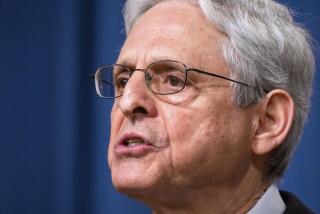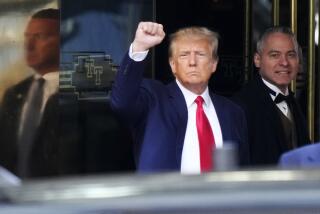Treason Charge Unlikely in U.S. Talib Case
- Share via
Many legal experts say the federal government is unlikely to file treason charges against John Walker Lindh, the so-called American Talib, because it is such a difficult crime to prove.
The Bush administration is weighing prosecution options that range from charging Lindh, 20, with treason, which carries a possible death penalty, conspiracy to murder or a lesser charge, such as providing aid to a terrorist organization.
Treason is a crime of distinction; it’s the only one defined in the U.S. Constitution. “Treason against the United States shall consist only in levying war against them, or in adhering to their enemies, giving them aid and comfort,” according to Article III, Section 3. To get a conviction, the government must have two eyewitnesses to the same overt act of treason or a confession in open court from the defendant.
That rigorous standard is a key factor in why there have been only 30 prosecutions for treason in U.S. history and none since 1952.
“It is hard to prove under the Constitution,” said Eugene R. Fidell, an attorney for the Coast Guard in the 1970s who now heads a Washington, D.C., organization of former military lawyers.
The framers of the Constitution, who only a decade earlier had been part of the United States’ successful war for independence, were very concerned about the possibility of abusive treason prosecutions--cases lodged in an attempt to silence the government’s political opponents rather than in response to actual criminal acts to topple the government, Fidell explained.
The Bush administration appears to be moving cautiously, despite a widespread outcry from the public and politicians, ranging from Sen. Hillary Rodham Clinton (D-N.Y.) to Senate Minority Leader Trent Lott (R-Miss.), in favor of a treason prosecution.
On Thursday, White House spokesman Ari Fleischer said the president would continue to receive recommendations on what the government should do with Lindh, who is imprisoned on the U.S. assault ship Peleliu in the Arabian Sea. Fleischer said he did not think that the administration would make a decision until at least next week.
“This is an extraordinary set of circumstances, to have an American who apparently was engaged in armed combat against the United States of America. And it’s in Afghanistan,” he said Thursday.
Justice Department spokeswoman Mindy Tucker said Atty. Gen. John Ashcroft has discussed the issue with President Bush but that the attorney general has only offered opinions and legal advice and has not made any specific proposals.
Senior Justice Department and other Bush administration officials said they needed more facts about Lindh’s relationship to the Taliban and Al Qaeda--and his role in the war and the prison uprising in which CIA agent John Michael Spann was killed--before determining what charges he should face.
Lindh was questioned briefly by Spann at a makeshift prison earlier this month but said little. Shortly after that conversation, a revolt erupted and Spann was killed.
During a taped interview, shown on CNN on Wednesday night, Lindh said he had not participated in the uprising. “I was in the basement the whole time. I didn’t see what was going on.” He characterized the revolt as “a mistake of a handful of people.”
Lindh was asked whether the Islamic jihad was what he thought it would be. He responded, “It’s exactly what I thought it would be.” Asked whether he believed it was the right cause, Lindh responded, “Definitely.”
The interview was conducted Dec. 2, shortly after Lindh was captured in the prison uprising and while he was being treated for a wound and given morphine.
Some lawyers have contended that Lindh could not be prosecuted for treason because there has not been a formal declaration of war. But New England University law professor Michael Scharf said: “The question of a declaration of war is not relevant. It was international armed conflict. Members of the American military were bombing and were involved in engagements on the ground.”
Still, Washington attorney Beth Wilkinson, who was one of the prosecutors against Oklahoma City bomber Timothy J. McVeigh, said it might be difficult for the government to find two credible witnesses to bring a treason case against Lindh. The military could call captured Taliban soldiers to testify against Lindh, she said, but they wouldn’t make effective witnesses.
Wilkinson also cautioned that a treason trial “could become a real platform for a political debate,” given the inherently political nature of such a case. “Prosecutors don’t want to give a defendant a platform for a debate on patriotism,” she said.
On the other hand, Wilkinson said it was possible that charges such as conspiracy or aiding and abetting could be lodged against Lindh stemming from Spann’s murder.
But that too could be difficult to prove, said UCLA law professor John S. Wiley, a former federal prosecutor.
As for conspiracy, “the prosecutor has to prove beyond a reasonable doubt that there was an agreement between the parties [on the scene] to engage in criminal conduct. It is not enough to prove that suddenly everyone started moving and someone ended up dead,” Wiley said.
Wiley cautioned that Spann’s murder “occurred halfway around the world” and that it is still being investigated.
Wilkinson said she thought it was most likely that the government would prosecute Lindh for providing “material support or resources” to terrorists, under a statute enacted in 1996 after the Oklahoma City bombing. The law was amended this year under the Patriot Act and now carries the possibility of a life term in prison if death has resulted from the terrorist acts. This crime, like most other crimes except treason, can be proved by circumstantial evidence.
While also cautioning that the case is still under investigation, Loyola law professor Laurie Levenson said, “The statute is very broad on what constitutes ‘material support,’ ” meaning that it is an easier law on which to base a prosecution.
During the last two weeks, James J. Brosnahan, a San Francisco lawyer hired by Lindh’s parents, has lamented that he has been unable to see the young man. And his parents, Frank Lindh and Marilyn Walker, have expressed dismay that a letter they sent to their son via the Red Cross has not been delivered.
On Thursday, Brosnahan said the parents have received no indication that the letter has been delivered. He declined to answer questions about whether he had any conversations about the case with the White House, the Justice Department or the Defense Department.
Lindh is being held as a “battlefield detainee” aboard the Peleliu, off the coast of Pakistan. Government officials believe that status allows him to be questioned for military information without having access to a lawyer.
The last person convicted of treason by the U.S. was Tomoya Kawakita, a Japanese American sentenced to death in 1952 for his treatment of American prisoners of war during World War II. Even that case created qualms; President Eisenhower commuted Kawakita’s sentence to life in prison.
*
Times staff writers James Gerstenzang and Josh Meyer contributed to this report.
More to Read
Sign up for Essential California
The most important California stories and recommendations in your inbox every morning.
You may occasionally receive promotional content from the Los Angeles Times.













